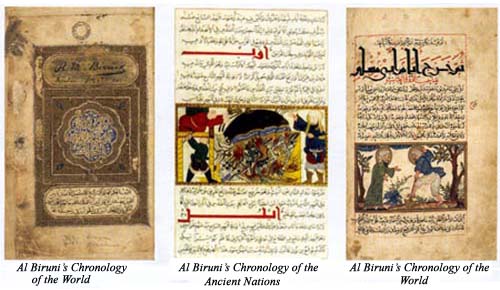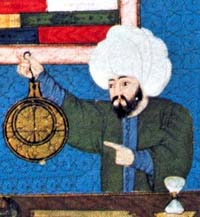|
The celebrated 10th century Moslem
scholar Abu Al Rayhan Muhammad Ibn Ahmad Al Biruni was
born in Kath, then the capital of the Principality of
Khwarezm, Khorasan - the present day city of Khiva in
Uzbekistan. The closest approximation of his birth date
is believed to be September 973 AD. Early in his life,
Al Biruni showed deep interest in the study of the
sciences. He started his scholarly scientific career at
the age of twenty-two, when he wrote a well-founded
exposition on the discipline of cartography.
Soon after this, admiration for Al Biruni's emerging
talent grew as he continued to produce insightful and
innovative works. At this early period, Sultan Mahmood
Ghaznawi invaded Al Biruni's homeland and, finding his
intellectual approaches of interest, soon offered him
patronage. Al Biruni accepted the offer, and accompanied
the Sultan in his travels to India on numerous occasions
for over two decades. During his lifetime, Al-Biruni
wrote more than a hundred books and documents dealing
with a broad range of sciences such as astronomy,
astrology, mathematics, geometry, geography, chronology,
history, physics, and medicine. Al Biruni's ability to
explore and research the different sciences was made
easier by his comfort with different languages. He was
fluent in Arabic, Persian, Turkish, Hebrew, Sanskrit,
and Syriac. He wrote most of his work in Arabic,
although that was not his native language. He explained
his affection for Arabic by the following passage in
which he wrote: "The sciences of the world have been
rendered to the language of the Arabs. They were
embellished. They penetrated the hearts. The beauty of
the language circulated in the veins and the arteries."
One of the most important books that Al Biruni wrote was
"Al Qanun Al Masudi" - ("The Canon of Al Masudi"). This
was a significant book on astronomy, which he entitled
in honor of Sultan Masud of Ghazna. In the book, he
endorsed the assumption in favor of the Earth's rotation
round its axis and showed precise results in determining
latitude and longitude measures. Another of Al Biruni's
books was the "Athar Al Baqiyah" - (Chronology of
Ancient Nations). In it, he proposes an anthropological
account of the formation and character of nations. In
the field of astrology, Al Biruni is known to have
astonished people by the accuracy of his forecasts. He
wrote "At Tafhim", or ("The Elements of Astrology"). In
another book,"Kitab As Saydalah", he proposes a
classification and description of drugs and their
application in medicine. In several of his books on
physics, Al Biruni explained natural springs in terms of
hydrostatics and made very nearly perfect measurements
of specific weights. He explained the ratios between
different metals including the densities of gold,
silver, mercury, lead, bronze, copper, brass, iron, and
tin. He then presented the results mathematically as
arrangements of integers and numbers of the form 1/n, n
= 2, 3, 4, ... , 10.
Kitab Al Hind and Other Works
Perhaps the most famous work of Al Biruni and his
masterpiece is the book "Kitab Al Hind" - the Book of
India. Throughout history, scholars from all over the
world have come to regard this work as his most
significant contribution. Under the patronage of Sultan
Mahmood Ghaznawi, Al Biruni set off to India for the
first time around 1017 AD. On arrival there, Al Biruni
was fascinated by the Indian culture. In "Kitab Al
Hind", he provides a detailed explanation of the
historical and social circumstances as well as other
aspects of India. During the time he spent there, Al
Biruni discovered the Hindu philosophy, mathematics,
geography and religion from the Pandits. In dialogue
with them, he was glad to offer them insight on Greek
and Arabic philosophy and scientific disciplines. The "Kitab
Al Hind" puts in context the religion and philosophy of
India, and tries to explain the caste system, as well as
the Indian wedding and funeral rituals. Further, Al
Biruni studied the Indian alphabets as well as the
Indian number systems, elaborating the principle of
position.
After he learned Sanskrit, Al Biruni studied the
authentic Indian scripts and translated many of them in
Arabic. One such text, called Sakaya, presents an
explanation about the creation of things and their
types. Another script, known as Patanjal, deals the
reality of the spirit leaving the body after death. In
Kitab Al Hind, Al Biruni makes a daring assumption that
the Indus valley must be have been an ancient sea basin,
a notion no one had proposed before that.
After Al Biruni returned from his journeys in India, he
decided to spend time in Ghazna, in Afghanistan. It was
there that he composed his well-known book "Al Qanun al
Masudi, fi al-Hai'a wa al-Nujum", which he dedicated to
Sultan Masud of Ghazna. In it, he provides a description
of the knowledge of the time pertaining astronomy.
Throughout the book, his theories are supported by
scrupulous mathematical verifications. Also described in
the book are the geometric and algebraic principles
necessary for accurately observing the movements of
celestial objects along their paths, and their distances
relative to Earth. "Al Qanun al Masudi, fi al-Hai'a wa
al-Nujum"also critiques a number of already existing
theories of astronomy, solar, lunar, and planetary
movements and positions. The book also contains a list
of the coordinates of six hundred places, almost all of
which Al Biruni had direct knowledge.

Scientific Involvement
It seems Al Biruni was a man who was genuinely
interested in almost everything around him. His
scientific inquiry led him to such remarkable results as
precise calculation of the specific densities of 18
different stones and metals. He reviewed those in his
book the "Kitab Al Jawahir" (the Book of the Pearls). In
the book, he employs hydrostatic principles to calculate
the specific gravity, by a method devised by Archimedes,
of 9 metals, based on the weight of gold, and 9 gems
based on the weight of "oriental sapphire". For example,
he gives the values of 19.05-19.26 for gold (actual
19.29), 8.72-8.83 for copper (actual 8.85), 12.74-13.59
for mercury (actual 13.56) and 8.55-8.67 for brass
(actual 8.40). In a completely different field, he also
produced the book "Kitab Al Saidana". This was an
encyclopaedic work, which bands together the Arabic
understanding of medicine with that of the Indian
knowledge.
In other scientific endeavours, Al Biruni found a way to
trisect an angle and solved other mathematical problems
which cannot be worked out with a ruler and a compass
alone. Also, almost hard to believe, hundreds of years
before anyone else, Al Biruni proposed the notion that
the earth rotates around its axis. Although adhering to
the then broadly accepted geocentric view of the world,
with the earth in the middle of the universe, he was
curious of the heliocentric view of the world - with the
sun being in the middle. Because of this, Al Biruni was
the first to undertake experiments related to such
astronomical facts. Eventually however, he left the
heliocentric argument because of his inability to
present actual confirmation. Related to these
observations, Al Biruni established that, in comparison
with the speed of sound, the speed of light is immense.
These and other of his mathematical discoveries make up
a broad base which deals with of theoretical and
practical arithmetic, summation of series, combinatorial
analysis, the rule of three, irrational numbers, ratio
theory, algebraic definitions, method of solving
algebraic equations, geometry, Archimedes' theorems and
more.
In his book on geography, "Kitab Tahdid Nihayat Al
Amakin", or Determining the Coordinates of the Cities,
Al Biruni put forward the notion of "descriptive
geography" by reviewing and describing the make up of
different geographical areas not only in terms of their
flora and fauna, but also in terms of the minerals
present in those regions. Here he also introduced
methods to determine distances on the earth by
triangulation techniques. This led him to finding out an
accurate value of the radius of the earth to be 6339.6
km, which was not obtained in the West before the
Renaissance in the 16th century. Confident of his
geographical knowledge of the world, Al Biruni drew up a
world map which is one of the earliest surviving such
maps. Also in this book, he claimed for the first time
that the Indus Valley is of sedentary origin.
Interestingly, he supposed that the Arab desert, in
contrast must have been an ancient sea, which had
receded. He made his assumptions on the fact its soil is
of stratified nature seen "when one digs wells ... and
with fossiles found in it."
The geography of the "Old World", as presented by Al
Biruni.
Here the South is at the "North
Pole". If rotated upside down, the lands of Africa, the
Arab Peninsula, Italy, Spain, and Asia Minor are
recognizable..
Al Biruni's most successful calculation of the
circumference of the earth from his book "Al Qanun Al
Masudi".
After having spent more than 40 years of study and
scientific contributions which he recorded in his books,
we can infer some facts about Al Biruni with a certain
degree of confidence. It is sad that only less than one
fifth of his texts have survived to the present, but
from them we can understand enough about the character
of this Moslem scholar. It must be said that Al Biruni
was in fact not the most vigorous scientific inventor.
He was nevertheless great in his insightful and profound
examination methods building upon the accumulated world
knowledge. His tasks were made ever so much easier by
the fact that he was fluent in so many languages. Using
this to his advantage, Al Biruni was capable of studying
authentic texts from numerous sources and of combining
them into more truthful and accurate scientific works.
It is estimated that the total number of books that Al
Biruni wrote throughout his scientific career comes up
to 146. Some sources round up the figure to180 books,
plus an impressive number of 13,000 "folios". (A folio
is a hand written document which is usually one to two
pages long). These estimates are correct to a great
extent. In his book "Fi Fihrist Kitab Muhammad Ibn
Zakariya Al Razi", Al Biruni himself registers 114 of
his own books.
Overall, Al Biruni deservers respect as an accomplished
scholar and a very able scientist. He was one of the
outstanding individuals of his time and duly many things
have been affected by his contributions. Al Biruni has
been regarded as one of the greatest intellectual
figures of the Islamic world and of the world as a
whole. His analytical mind, his devotion to discovering
reality, and his precise methodical techniques enabled
him to accomplish great results. His fervor for learning
can be noted from his phrase, which states: "The fact
that Allah is Omniscient does not justify ignorance."
|
